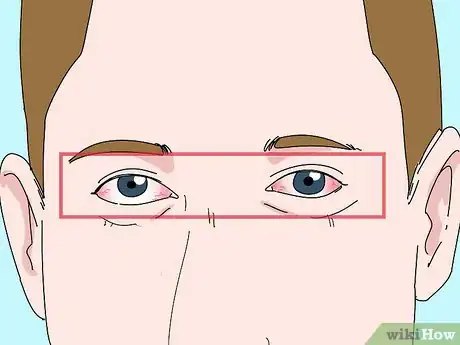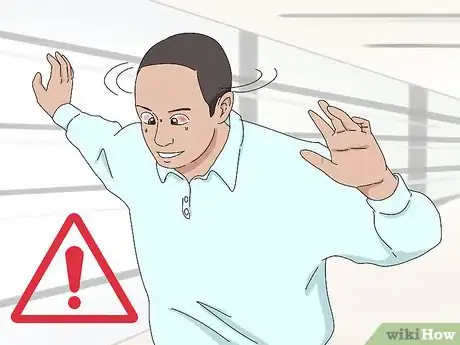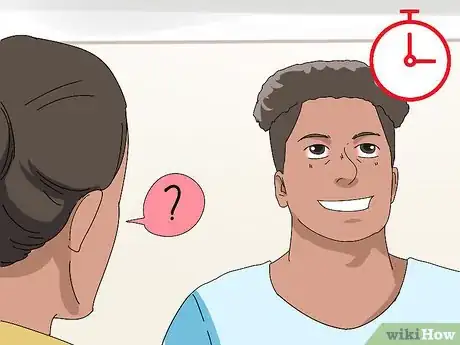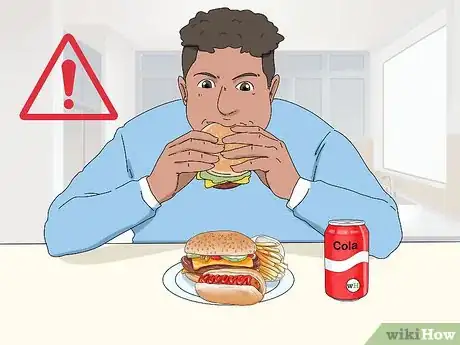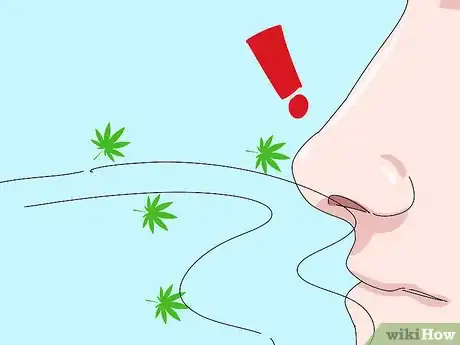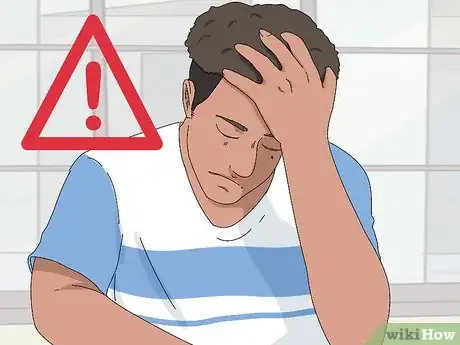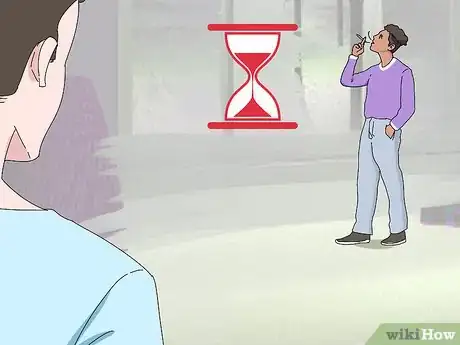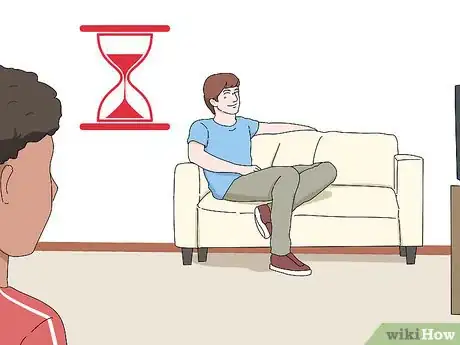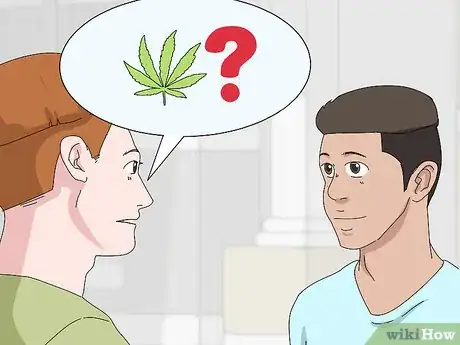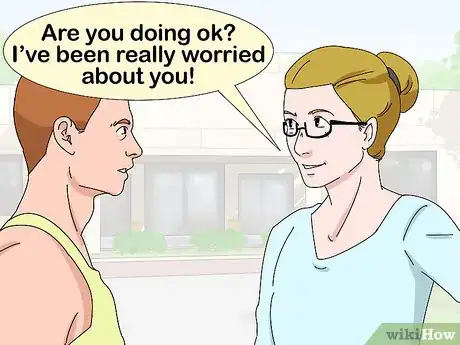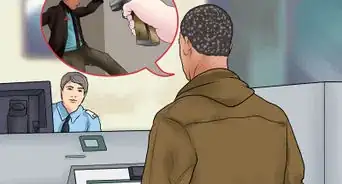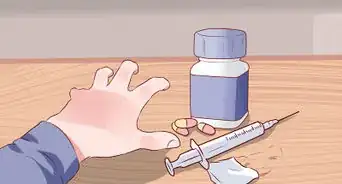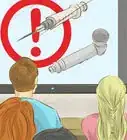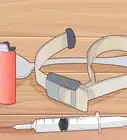This article was co-authored by Klare Heston, LCSW and by wikiHow staff writer, Megaera Lorenz, PhD. Klare Heston is a Licensed Independent Clinical Social Worker based in Cleveland, Ohio. With experience in academic counseling and clinical supervision, Klare received her Master of Social Work from the Virginia Commonwealth University in 1983. She also holds a 2-Year Post-Graduate Certificate from the Gestalt Institute of Cleveland, as well as certification in Family Therapy, Supervision, Mediation, and Trauma Recovery and Treatment (EMDR).
There are 7 references cited in this article, which can be found at the bottom of the page.
This article has been viewed 90,833 times.
Marijuana (also known as cannabis, pot, or weed) is a plant-based drug that can be inhaled as smoke or consumed in an edible form.[1] Marijuana affects different people in different ways, so the signs and symptoms of marijuana use may vary from one person to another. If you are concerned that a friend or family member might be using marijuana, look for the most common physical and mental symptoms, such as bloodshot eyes and decreased reaction time. You might also notice other signs, such as characteristic smells, or changes in the person's behavior and interests. If you see evidence of marijuana use, try communicating with the person about your concerns.
Steps
Recognizing the Symptoms of Marijuana Use
-
1Look for bloodshot eyes. Someone who has been using marijuana may have very red or bloodshot eyes.[2] However, don't rely on this symptom alone as an indication of marijuana use. Red eyes can also be caused by any number of other things, including:[3]
- Allergies
- Illness (such as a common cold)
- Lack of sleep
- Recent crying
- Irritants in the eyes
- Excessive sun exposure
-
2Watch for signs of dizziness. Someone who has recently consumed marijuana may become dizzy or uncoordinated. If they stumble a lot, seem unusually clumsy, or complain of feeling dizzy, these may be signs of marijuana use.[4]Advertisement
-
3Check their reaction time. Marijuana affects a user's perception of time and can cause their reaction time to be much slower than it is while they are sober.[5] For example, if you are conversing with someone who is high on marijuana, you may need to repeat yourself several times or wait for a long time before they respond to something you have said to them.
- Because of their slowed reaction time, people under the influence of marijuana are at high risk of getting involved in accidents if they attempt to drive.
- If a person who you suspect is high is attempting to drive, you can casually offer to drive for them.
-
4Make note of memory and concentration problems. In addition to slowing reaction time, marijuana use impairs memory function. Someone who is high on marijuana may have difficulty remembering something that just happened, or they may find it hard to maintain a conversation or train of thought.[6]
-
5Check for excessive giggling or silly behavior. Marijuana can cause euphoria and uninhibited behavior. A person who is high on marijuana may laugh for no obvious reason or laugh excessively over things they wouldn't normally find that funny.[7]
- This is especially important to notice if silliness is out of character for the person.
-
6Pay attention to their eating habits. Marijuana use can stimulate the appetite. A person who has been using marijuana may get “the munchies” and feel the urge to snack more than usual.[8]
-
7Look for signs of anxiety or paranoia. While marijuana often creates a relaxing or euphoric effect, it can also cause agitation, anxiety, or delusional thinking. Someone with marijuana-induced anxiety may also experience an elevated heart rate or even a full-blown panic attack.[9]
Observing Other Possible Signs
-
1Check for the smell of marijuana. Marijuana has a distinctive odor that may be musky or skunk-like, and often slightly sweet. This smell may linger on a marijuana user's clothing, breath, skin, or hair. You might also notice it in a room where they smoke or store their smoking implements.[10]
- Someone using marijuana may try to hide the scent by wearing perfume or cologne, using breath mints, or using incense or air fresheners in the room(s) where they smoke.
-
2Look for items related to marijuana use. Marijuana can be consumed in a variety of different ways. Look around for any of the following types of implements:[11]
- Rolling papers or blunt wraps
- Pipes (often made of glass)
- Bongs (or water pipes)
- Vape pens
- Grinders
-
3Watch for changes in behavior and relationships. Long-term marijuana use can lead to a variety of mental and behavioral changes. A marijuana user may experience a loss of energy and motivation. Depression, anxiety, and other mental health issues may get worse or appear for the first time. Marijuana use can also affect interpersonal relationships and school or work performance. You might also notice:[12]
- A lack of interest in things the person used to enjoy.
- A change in habits relating to money. For example, the person may frequently ask for money, start stealing money, or go through money rapidly without being able to explain where it is going.
- Evasive behavior (e.g., acting like they are trying to hide something, or not giving straightforward answers to questions about what they're doing).
Communicating with the Person
-
1Wait until the person is sober to talk about it. If you want to discuss your concerns about a person's possible drug use, it is best to approach them when they are sober and thinking clearly. Someone who is high on marijuana may have trouble communicating with you or following what you are trying to say.[13]
-
2Pick a time to talk when the person is calm and relaxed. It's best to catch the person when they're in a relatively calm mood. If they've had a rough week, or the two of you have been fighting all day, it's probably better to hold off until the person is in a more positive state of mind.
- Attempting to talk when the person is in a bad mood can make them more defensive, which means the conversation probably won't be very productive.
-
3Ask them if they are using marijuana. Depending on the type of relationship you have with the person, you may be able to ask up-front if they are using marijuana. Keep your approach simple, straightforward, and non-judgmental.
- For example, you might say, “Hey, you've been acting different lately, and I noticed a funny smell in your room. Have you been smoking marijuana?”
-
4Let them know you are concerned about them. If the person thinks you are angry at them or judging them, they are less likely to open up to you. Make it clear that you are sympathetic and just want to help.
- For example, when talking to a friend, you might say, “I noticed you've been canceling a lot when we try to make plans, and you always seem so tired when I see you. Are you doing ok? I've been really worried about you!”
-
5Stay calm. Panicking or getting angry is usually counterproductive. Talk to the person calmly, without raising your voice, making threats, or being sarcastic. If you approach them in a hostile or fearful way, they will be less likely to open up to you, and the situation may become worse.[14]
Warnings
- Any of the signs or symptoms or marijuana use alone could have some other underlying cause. For example, do not jump to the conclusion that someone is using marijuana just because they have bloodshot eyes or are unusually giggly. Take time to observe their overall behavior, and try communicating with them before making a judgment.⧼thumbs_response⧽
References
- ↑ https://www.drugabuse.gov/publications/research-reports/marijuana/what-marijuana
- ↑ http://learnaboutmarijuanawa.org/parentsguide2017.pdf
- ↑ https://medlineplus.gov/ency/article/003031.htm
- ↑ http://learnaboutmarijuanawa.org/parentsguide2017.pdf
- ↑ http://www.mayoclinic.org/diseases-conditions/drug-addiction/basics/symptoms/con-20020970
- ↑ http://learnaboutmarijuanawa.org/parentsguide2017.pdf
- ↑ https://easyread.drugabuse.gov/content/signs-marijuana-use-and-addiction
- ↑ http://www.mayoclinic.org/diseases-conditions/drug-addiction/basics/symptoms/con-20020970
- ↑ http://www.pbs.org/wgbh/pages/frontline/shows/dope/body/effects.html
- ↑ http://learnaboutmarijuanawa.org/parentsguide2017.pdf
- ↑ http://learnaboutmarijuanawa.org/parentsguide2017.pdf
- ↑ http://learnaboutmarijuanawa.org/parentsguide2017.pdf
- ↑ http://www.hazeldenbettyford.org/articles/what-can-i-say-to-get-you-to-stop
- ↑ http://learnaboutmarijuanawa.org/parentsguide2017.pdf
About This Article
You might be concerned if you think someone you know has been using marijuana, but once you know for sure, you'll be able to talk to them about it. Signs of using marijuana can vary from person to person, but the most obvious sign is having bloodshot eyes. Someone who has used marijuana may also have a slow reaction time, so check to see how quickly they respond when you talk to them. If they have trouble concentrating or remembering things, they could be high. Someone who has used marijuana may also seem extra anxious or extra relaxed. Besides physical signs, the person may smell musty or like a skunk. Keep in mind that these things don't necessarily mean the person's using marijuana. They could just be tired or upset. If you do think the person is using marijuana, don't be afraid to talk to them about your concerns. Just wait for a time when they're sober so you can have a productive and relaxed conversation. To learn more about how to talk to someone about their marijuana use, read on!
